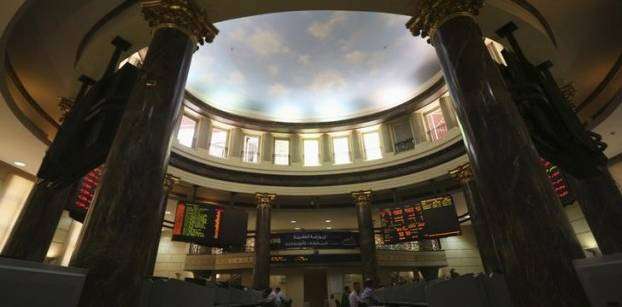Egypt jumps on IMF loan talks, oil pulls down Gulf

Egyptian stock exchange. Reuters
By Andrew Torchia
DUBAI (Reuters) - Egyptian stocks surged on Wednesday on news that Cairo was close to agreeing an International Monetary Fund (IMF) lending programme, while weak oil prices pulled down most bourses in the Gulf. The main Egyptian equities index EGX30 climbed 5.0 percent to 7,915 points, its biggest daily gain since mid-March, in the market's heaviest trade since mid-April.
Blue chips favoured by foreign investors outperformed with Commercial International Bank COMI.CA, the largest listed lender, jumping 5.7 percent and Global Telecom GTHE.CA up 6.1 percent.
Financial firm EFG Hermes HRHO.CA, which could benefit from handling an inflow of foreign investment if the IMF loan stabilises Egypt's struggling balance of payments, rocketed 10.7 percent.
Ibrahim al-Nimr, head of technical analysis at Cairo's Naeem Holding, predicted the index would break above 8,000 points when the signing of the IMF loan became certain.
"This may in turn prompt some profit-taking at those levels, but even then we expect certain sectors to continue riding the bull wave, especially banks and real estate."
The government said it was seeking $7 billion annually from the IMF over three years. Prime Minister Sherif Ismail ordered the central bank governor and minister of finance to complete negotiations for the programme with an IMF team that would visit Egypt in the next few days. An IMF deal, and attached economic policy conditions, could help to revive foreign investor confidence in Egypt and allow it to remove some of the curbs on access to hard currency that have plagued the economy.
Some fund managers think an IMF deal in August or September - and possibly an interest rate hike at a central bank meeting this Thursday - could create conditions allowing authorities to engineer a controlled devaluation that would bring the Egyptian pound to levels which reignited fund inflows into the country.
But there are many risks. An initial devaluation in March this year failed to spur fund inflows, and $21 billion over three years would probably not be enough by itself to repair Egypt's balance of payments, especially if Gulf donors decide to cut their aid in response to their own budget pressures.
Also, the IMF programme could involve fiscal tightening that would prevent any quick recovery in economic growth.
"We believe foreign investors should stay underweight on Egypt until the extent of devaluation is clear," said EFG Hermes. "Cyclical stocks are likely to remain under pressure as domestic demand – already under pressure for the past 18 months – will be squeezed in the first phase of any IMF programme."
GULF
In the Gulf, Dubai's index DFMGI fell 0.9 percent in a broad-based decline. Emaar Properties EMAR.DU lost 0.3 percent to 6.88 dirhams; since last week it has been unsuccessfully testing chart resistance on its October peak of 7.01 dirhams.
Logistics company Aramex ARMX.DU rose 1.3 percent after jumping 5.5 percent on Tuesday. After the close on Tuesday, Bloomberg reported, citing unnamed sources, that founder FadiGhandour had sold his entire 9.9 percent stake in the firm to Gulf investors including Emaar chairman Mohamed Alabbar. Dubai exchange data on Wednesday showed no such ownership change.
In Saudi Arabia, the index TASI fell 0.6 percent as National Commercial Bank 1180.SE lost 2.9 percent after its board recommended a cash dividend of 0.60 riyal per share for the first half, down from 0.80 riyal a year earlier.
Low-cost retailer Abdullah Al Othaim 4001.SE dropped 1.5 percent after posting a 9.6 percent drop in quarterly profit, citing higher personnel and promotional expenses as well arises in transport and electricity costs due to austerity measures in the 2016 state budget.
But petrochemical giant Saudi Basic Industries 2010.SE gained 1.8 percent before the release of its second-quarter earnings, expected after the close.
Retailer Fawaz Abdulaziz Alhokair Co 4240.SE gained 2.6 percent after reporting a 0.9 percent year-on-year rise in quarterly profit to 212.6 million riyals ($56.7 million). It cited the contribution of new stores and demand during the holy month of Ramadan. EFG Hermes had forecast 170.1 million riyals and NCB Capital 190.0 million.
Qatar's index QSI rose 0.6 percent as Qatar Islamic Bank QISB.QA, which beat forecasts with its second-quarter earnings last week, surged 2.9 percent in the market's heaviest trade.









facebook comments